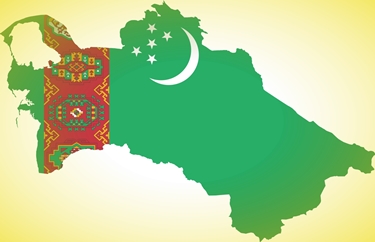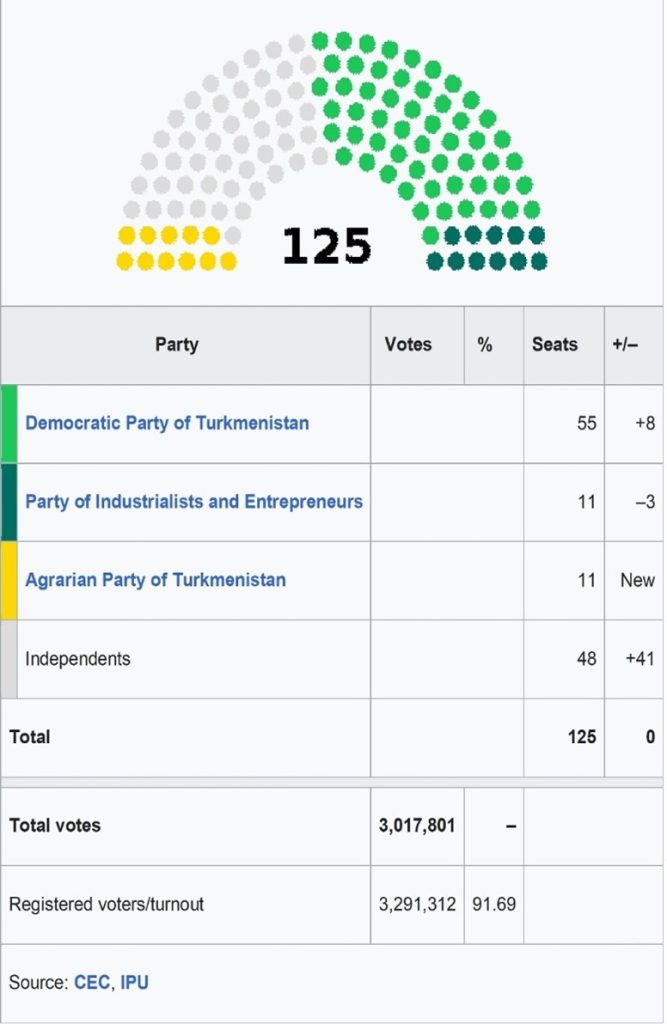nCa Commentary
The people vote according to their collective and individual thoughts and opinions. That is why a parliament is the reflection of its times.
The current parliament of Turkmenistan is nearing the end of its term and the elections commission has announced that the elections for the next parliament will take place on 26 March 2023.
These are interesting times. So much is happening in the country, and the world.
First, let us look at the composition of the current parliament of Turkmenistan and then we will try to identify some of the factors that may affect the thought process of the voters.
The parliament of Turkmenistan has 125 members. The chairman of the sitting parliament is Ms. Gulshat Mammedova (Gülşat Mämmedowa). She won the elections as an independent candidate.
Her predecessor was Ms. Akja Nurberdieva, who contested the elections on the ticket of the Democratic Party of Turkmenistan.
There are three political parties in Turkmenistan —– Democratic Party of Turkmenistan (DPT), Party of Industrialists and Entrepreneurs of Turkmenistan (PIET), and Agrarian Party of Turkmenistan (APT).
|
2018-2023 |
|
| Party | Leader |
| Democratic Party of Turkmenistan | Ata Serdarov |
| Party of Industrialists and Entrepreneurs of Turkmenistan | Saparmyrat Owganow |
| Agrarian Party of Turkmenistan | Rejep Bazarow |
As can be seen in the above graphic, the independents occupying 48 seats are the decisive block in any legislation work.
Turkmenistan has a presidential form of government and there is no position of a prime minister in the system. The president, in his capacity as the head of the cabinet of ministers, fulfills this function.
The main function of the parliament, therefore, is the legislation. As such, in the composition of the current parliament, no single party can pull a legislation on its own. There has to be the consensus of the house.
It is too early to say whether the elections next month will also lead to a comparable distribution of seats among the political parties and the independents.
However, we can certainly point out some of the factors that will influence the voters.
The first of these is the fast-paced process of broad-based integration in the Larger Central Asia (LCA) region. LCA includes the five countries of Central Asia, and China and Russia.
Treaties are being signed every which way to create alliance relations, and comprehensive strategic partnerships. The new energy and transport projects are springing up almost every week. Cooperation arrangements are being made in every area including education.
At grassroots level, it means more job opportunities, that too of better paying jobs because of the technologically advanced projects.
More and more countries in LCA are willing to accommodate higher number of students from the partner countries.
This takes care of two important segments of the voters – the students who have reached the voting age, and the young people who are entering the job market.
Then, there is the process of reforms in the agriculture sector. This includes the allocation of land on lease of up to 99 years, the availability of small tractors on easy bank loans, the subsidies on the fertilizers and the seed and the state support in irrigation and farm-to-market chain. Small land plots of up to 5 hectares are also part of the process to enable the individual families to benefit the most from their hard work. This is another major segment of the voters.
There is also the overlap of the agricultural and business sectors that unites the interests of the business and agricultural communities at some levels. For instance, the greenhouse revolution that has made Turkmenistan the net exporter of tomatoes and some vegetables has created the partnership between the businesspersons and the farmers. Also, the transport companies, from the major logistics organizations to individual truck owners, are a part of the mix even though they are neither farmers nor purely business houses. They are voters with a set of opinions of their own.
The easy loans with generous grace period for just about any purpose including the purchase or construction of a house, furnishing of a home, purchase of a car or commercial vehicle, education abroad, start of a small business etc. are also a factor.
The voters will certainly see as to which candidate may not only protect these privileges and facilities for them but, if possible, add to them through further legislation.
Another dimension is conversation. Pure and simple conversation. People talk to each other and they listen to each other.
The weddings, birthday parties, the sports and hobby clubs, the teahouses and just any other place or occasion where the people gather is the opportunity for conversation. Some decisions on who to vote for will be made during these conversations.
The power of the social media and the number of rising social media stars is another factor to keep in mind. Directly or indirectly, the social media can shape the voters’ decision.
Whatever is happening in the region and the world would also influence the voters.
The parliament that takes shape next month will be the reflection of our times. /// nCa, 30 January 2023


